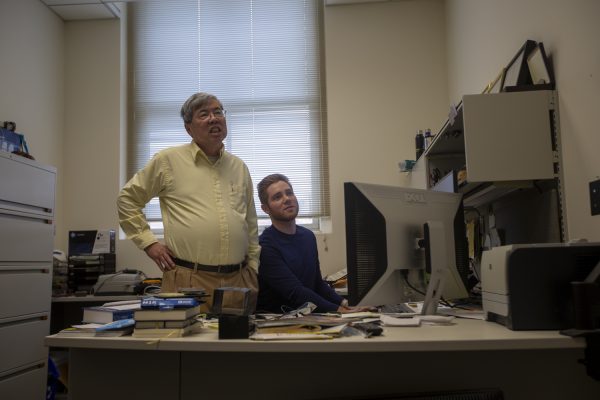UI community reflects on effect of Crazy Rich Asians
Crazy Rich Asians is a big box office success, bringing an Asian cast to a mass audience.
The Crazy Rich Asians poster for screening times outside of the Marcus Sycamore Cinema located in Iowa City on Aug. 22, 2018. Crazy Rich Asians features a mostly-Asian cast and has earned $34 million at the box office. (Katie Goodale/The Daily Iowan)
August 23, 2018
Crazy Rich Asians could soon join 13 Going on 30, 10 Things I Hate About You, When Harry Met Sally, and other rom-com hits in the film industry.
The film, starring Constance Wu, hit the theaters on Aug. 15, and commercial success followed immediately. The romantic comedy has made more than $45 million in a week.
Lots of buzz surrounding the film has noted the rarity for a movie with a predominantly Asian cast to achieve such success, and it could certainly pave a more opportune path for Asian-Americans directors, producers, and actors in Hollywood.
Though it has received high praise and positive reviews from movie critics, there are certain dangers accompanying movies that become one of the few featuring an all-Asian cast.
Often, movie-goers add pressure when it comes to films with a diverse cast, said University of Iowa Associate Professor Naomi Greyser. There is a high level of expectation for directors and filmmakers to create a breakthrough film for whatever group they represent, she said.
It’s not uncommon for audience members to carry this expectation, she said, but when the most notable representation of Asian-Americans arrives in 2018, it raises the question of whether an expectation such as this is necessary to continue breaking barriers for other diverse films.
“It isn’t fair to say that Jon Chu needs to bust open the doors for everybody, but I also feel like it’s also not fair to say that he gets to enjoy success, and he shouldn’t think about anybody else,” Greyser said.
UI student Grace Omachi agrees with Greyser.
“This was a good movie, but I don’t know if Asians will come out more,” she said.
Though the success of a film such as Crazy Rich Asians bodes well for other Asian-American filmmakers, it doesn’t guarantee the success of other Asian films and television shows, Omachi said. Though seemingly a television hit, shows such as “Fresh off the Boat” face trouble when it comes to season renewals, she said.
It’s still quite a stride for filmmakers to include Asians in a romantic-comedy in addition to an on-screen presence while omitting the racism and stereotypes, Greyser said.
“I feel like Crazy Rich Asians seems to confirm so many ideas about romance in order to expand a lot of ideas for a broad American audience about Asians and Asian-Americans,” she said.
UI junior Komachi Brown and Omachi noted they entered the theater expecting an Asian audience, but they discovered that most of the seats were occupied by white women.
“I like seeing Asian actors in films not necessarily made for Asians, because it portrays an Asian person as a regular, ordinary person,” Brown said.
In an NPR interview, director Jon Chu said the movie certainly cannot fulfill the expectation that people hold of an all-Asian film. He said he has always wanted to see someone like himself on screen. For now, “I’m making it for my own, 12-year-old self, and my [infant] daughter, and the generation that’s coming,” he said.
















